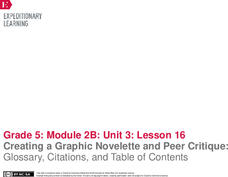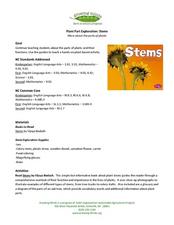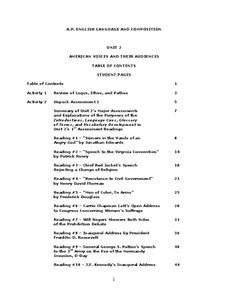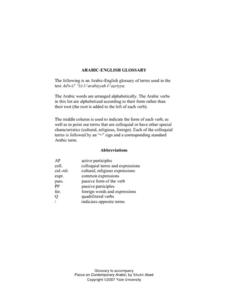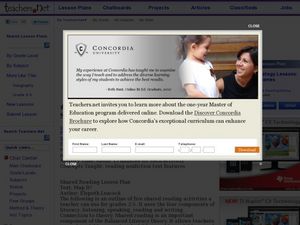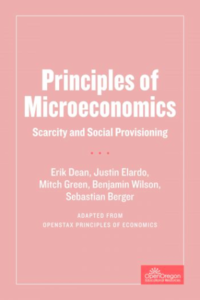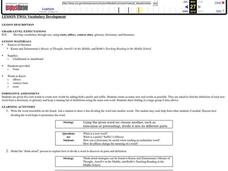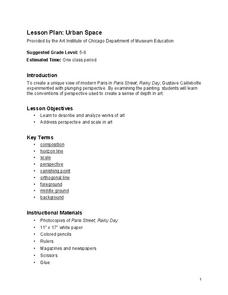K12 Reader
Glossary of Non-Violence
Make sure your class is sure of terminology when referring to the non-violent methods used in the civil rights movement. This glossary includes 19 terms paired with parts of speech and definitions.
Curated OER
Glossaries
Explore text structure with a focus on the glossary feature in informational texts. Learners read a brief introduction before examining a glossary from a text about plants. They reference it while completing four comprehension questions....
EngageNY
Creating a Graphic Novelette and Peer Critique: Glossary, Citations, and Table of Contents
A, B, C ... let's alphabetize to get organized! Using the informative resource, scholars create an alphabetized glossary of key words for their graphic novelettes. Additionally, they create a table of contents and citations page.
Curated OER
Introduce: Comprehension Monitoring using About Trees
As scholars begin reading more difficult text, they need to acquire an arsenal of comprehension strategies. Here are few helpful ones to guide new readers through the informational text About Trees, which is linked here for printing....
Curated OER
Research and Study Skills: Dictionary/Glossary
What is the difference between a dictionary and a glossary? After looking at series of dictionary and glossary entries (included on the worksheet itself), learners are asked to explain the differences between these two reference...
All Things PLC
Glossary of Key Terms and Concepts
Considering creating a Profession Learning Community at your school? Here's a seven-page glossary of key terms and concepts, everything from action orientation and adaptive to values and vision, that all members should know to...
Curated OER
Plant Part Exploration: Stems
Explore water transport in plant stems using this fun experiment! Your scientists will start by reading Stems by Vijaya Bodach. Then, activate prior knowledge about plant stem functions and water transportation. Demonstrate this concept...
Curated OER
Identifying Text Features of a Self-Written Fable
Make learning the parts of a book fun by having pupils construct their own glossary entries, table of contents, and title page. Beginning with a review of text features and a hunt for examples, kids use previously written fables to...
Curated OER
Introduce Vocabulary: Into the A, B, Sea (Rose)
As budding readers learn about the ocean, they'll get practice with the alphabet and new vocabulary words (cling, nab, prey, slumber, and thrive) in context. Read Deborah Rose's book Into the A, B, Sea, which includes a glossary in the...
Northshore School District
American Voices and Their Audiences
Those new to teaching an AP level language and composition prep course and seasoned veterans will find much to treasure in a unit that is designed to help young language scholars develop the skills they need to analyze the language...
Yale University
Arabic - English Glossary
Designed to accompany Focus on Contemporary Arabic by Shukri Abed, this document provides 41 pages of Arabic terms with English translations. The words are organized alphabetically in Arabic and include notations that indicate colloquial...
EngageNY
Using Informational Text Features and Learning Freaky Frog Vocabulary
What kind of text features help children build a strong vocabulary? Class members use text features such as headers to unpack new vocabulary words. They create vocabulary journals in which they will write what they think the definition...
Curated OER
Writing and Presenting a Fable Using Research
Elementary and middle schoolers research animal facts and use them in a fable. First, they pair-share to find animal traits to use in writing a fable. They then complete a prewriting worksheet. After going through the writing process,...
Curated OER
Using Social Studies in Five Shared Reading Lessons: Geography
After several short 15-minute mini-lessons, your learners will gain an understanding of the characteristics of a non-fiction text. Using the book Map It by Elspeth Leacock, your class will become acquainted with non-fiction terms such as...
Open Oregon Educational Resources
Principles of Microeconomics: Scarcity and Social Provisioning
There’s no such thing as a free economics course, but here's a resource that is as close as you can get. Drawing on the expertise of a textbook, augmented by input from higher education economics instructors, a helpful eBook presents a...
Curated OER
The Glossary
In this glossary worksheet, students read information about a glossary and practice usage referring to the glossary example on the worksheet. Students answer four questions using a glossary.
Curated OER
Native American Glossary
Learners develop a glossary of English language words with Native American origins. They discuss a list of words, look up the words in a dictionary, and compile the definitions in alphabetical order in a class glossary.
Curated OER
Using the Glossary
Fifth graders explore the glossary. In this language arts lesson, 5th graders define unknown words in a text by using the glossary. Students read a text and use the glossary to find unknown words.
Curated OER
Glossary: computer verbs
In this glossary worksheet, students create a glossary of verbs they use while using the computer. Students create a glossary for 12 verbs.
Curated OER
First You Take an Ecumene
Although this was written regarding Canadian agriculture, it can be used in any agriculture or environmental science class. Learners evaluate agricultural and economic activity maps and consider land use competition. Activities that get...
Curated OER
Wrapping It Up
Class members develop their own glossaries for unfamiliar words in each chapter in Elizabeth George Speare’s The Sign of the Beaver. After recording the word, the page number on which the word appears, and its part of speech, they...
Curated OER
Vocabulary Development
What is a root word? What is a prefix? Suffix? Use these questions to spark a discussion amongst your language art learners. Then, start by writing the word irresistible on the board and have teams of learners attempt to create new words...
Echoes & Reflections
Perpetrators, Collaborators, and Bystanders
After the Holocaust, the world grappled with how to bring justice to the Nazis. But what to do with the thousands—if not millions—who allowed it to happen? Young historians consider the issues of guilt, collaboration, and responsibility...
Art Institute of Chicago
Urban Space
The use of perspective is clear in Paris Street; Rainy Day by Gustave Caillebotte. Pupils study and discuss this example, marking the vanishing points and horizon line of a photocopy of the piece. They then create their own urban scene...




